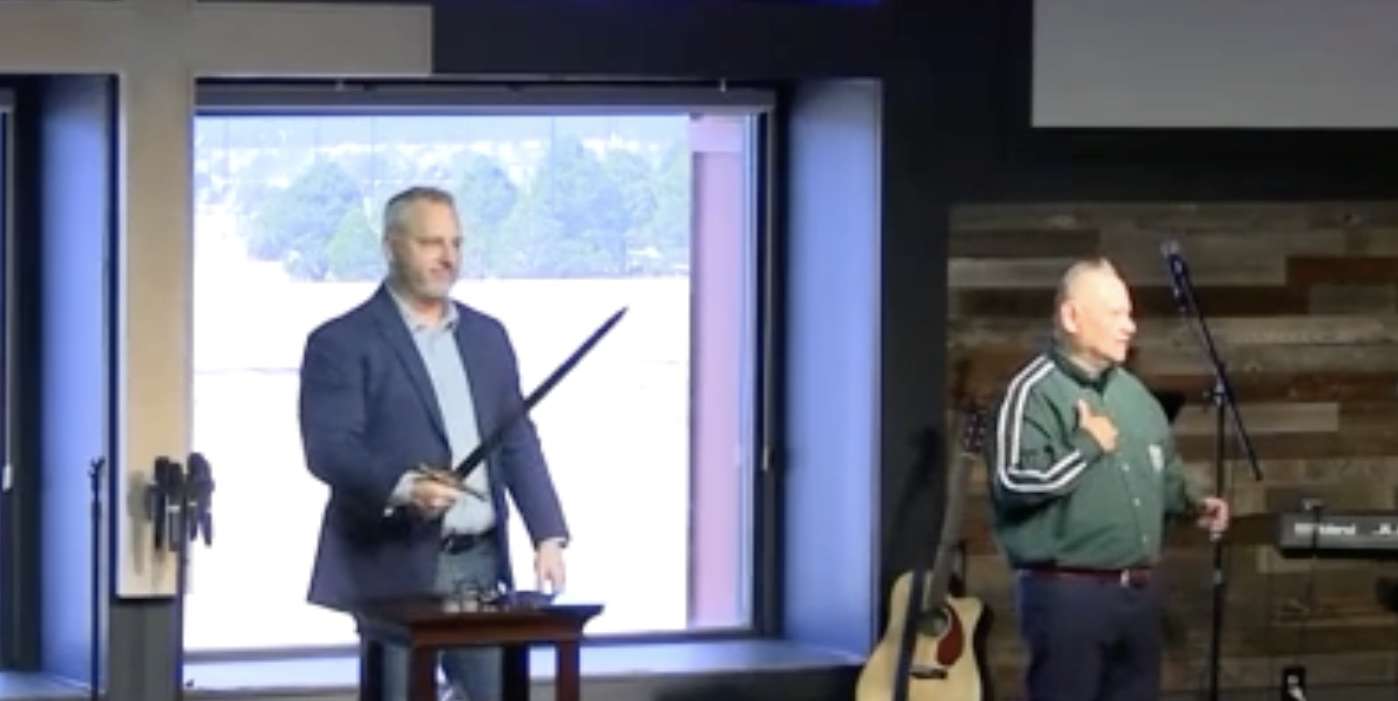“The church is not more powerful in Colorado than Satan is. I mean, think about what I’m saying. If that was different, wouldn’t we be able to do something about this?”

That was what state Rep. Scott Bottoms (R-Colorado Springs) said during a sermon early last year, before he was elected to Colorado’s legislature. The source of his anger: Colorado Democrats’ policy wins, including multiple protections for abortion rights and a 2019 bill codifying comprehensive sex education – both things that fundamentalist Christians like Bottoms tend to vehemently oppose.
Progressives lauded the 2019 sex education bill as a step forward from ineffective abstinence-only education. But Bottoms said that the bill’s proponents were ‘pedophiles,’ and that they should be jailed.
“I know people disagree with this, but I think the people that instituted that [sex education bill] and the people that are instituting it regularly, I think they’re pedophiles and they should be put in jail for that,” Bottoms said. “When you’re teaching five year olds perversion at that level, you should be put in jail for it. That’s pedophilia. But we don’t have enough power.”
During this speech, Bottoms frequently returned to the power of the Christian church, wishing that the church had the power to dictate U.S. policy in accordance with religious teaching. He is far from the only one. This is the core tenet of Christian nationalism, a movement aiming to turn the U.S. into a theocratic government, which some scholars say would violate the intention of the U.S. Constitution’s Establishment Clause.
“Christian nationalism is the idea that Christians should be privileged in the country in some way,” said Dr. Brad Onishi, an adjunct professor at the University of San Francisco and co-host of the podcast “Straight White American Jesus,” who has studied the movement in depth. “And that could be in what we might think of as more or less benign ways, even though I’m not sure that’s the right word. You know, the church lady who thinks that it’s a good thing that we have ‘In God We Trust’ on the money, or that we have only had Christian presidents.”
But Onishi also said that Christian nationalism can manifest in ways that are less benign. “Christian nationalism is also the idea that Christians should be privileged in big ways. So data shows us that something like 9% of Americans think that only Christians should be citizens and 14% think that the church should have a veto power over the Supreme Court’s decisions. You can see, there, Christian nationalism in full force.”
Christian nationalism has taken root in Colorado politics even beyond the statehouse. U.S. Reps. Doug Lamborn and Lauren Boebert have spoken at multiple overt Christian nationalist events in recent years. At one event, Boebert said that “The church has relinquished too much authority to government.” Shortly afterwards, Lamborn directly praised the “Seven Mountain Mandate,” a fringe religious doctrine which directs Christians to take over the prime aspects of culture.
The first half of this story, which you can read here, examined how Bottoms climbed to a place of de facto prominence among his Republican colleagues, in part because of his extreme policy positions. This second installment aims to take a closer look at why Bottoms, and others like him, hold those positions in the first place.
“I Felt God Speaking To Me”
In his youth Bottoms attended Southwestern Assemblies of God University (SAGU) in Texas. As its name indicates, SAGU adheres not to Christianity in general, but to the specific denomination represented by the Assemblies of God. The Church at Briargate is formally registered as part of the Assemblies of God.
Bottoms left SAGU to pursue the life of a youth pastor, though he would return a decade later to finish his degree.
Bottoms, along with his wife Linda, began pastoring at Briargate in Colorado Springs in 2012. His sermons were not recorded online until 2017, but intolerance seems to have already been his norm by then. In a November 2017 sermon, he lambasted preachers who refuse to condemn homosexuality, going so far as to directly call it “a trick of Satan.”
“But the pastor of Hillsong in New York City, he kept hemming and hawing around and wouldn’t admit that, wouldn’t say that homosexuality was a sin. Well, I can’t be a new creation in Christ Jesus if I believe that homosexuality is legit. It’s not the way God created me,” Bottoms said. “If God saves me, and creates me new, then that means I have to leave the sin. And if I believe that that sin is how I was designed, I can’t be a new creation theologically. I can’t be a new creation in Christ Jesus.”
He continued, “But we’re struggling in society even defining what Scripture lays down very specifically as sin. Well, this is a trick of Satan.”
As the years went on, Bottoms’ fiery rhetoric did not cool down. If anything, some of his sermons took on a more overtly political focus, as he commented directly on events in both statewide and national politics, such as the nomination of Amy Coney Barrett to the U.S. Supreme Court, as well as Colorado Democrats’ push for legislation on comprehensive sex education and abortion.
“Colorado is trying to vote abortion laws in to contradict Roe v. Wade. You know what that tells me? That tells me the church in Colorado has a form of godliness, but not enough power to actually do something,” Bottoms told his congregation on Mar. 6, 2022. “We can talk it. We can put out our fliers and we can stand against all the bad stuff. But apparently, the church is not more powerful in Colorado than Satan is.”
Bottoms went on to lament that devout Christians like him are not in charge of the government, creating a firewall against what he feels to be Satanic influence.
“Where is the power that can look Satan in the face and say, ‘You are not in authority. My God’s in authority,’” Bottoms said. “And by the way, there are places around the planet that do exist like this. That the church does have power and that society is not in charge. That the godly people run the show. But that’s not the case. Definitely in Colorado, maybe other places in the United States more, but not in Colorado.”
Just one day later, on Mar. 7, 2022, Bottoms filed to run for Colorado’s state legislature, where he would go on to represent House District 15.
“After much consideration and prayer together with my wife, I felt God speaking to me about running for office, so I did,” he said in an interview with SAGU. “However, I am a pastor at heart. Being a representative isn’t something I really wanted to do, but I do it out of obedience to the Lord.”
Onishi told the Colorado Times Recorder that ideas about being chosen by God are common among Christian nationalist politicians.
“Part of what’s going on there is a kind of humility on the surface. ‘I’m not doing this to be Mr. Popular and Mr. Look-At-Me; I’m just doing it because that’s what I was called to,’” said Onishi. “However, there’s also embedded in that way of thinking, that ‘yeah, God called me to do this because I’m representing God, right? He called me to be in this position.’”
Demons, or Just Disagreement?
Much has already been written, including by this publication, about Bottoms’ proclivity for referring to things he opposes as “demonic,” or as the work of the biblical Satan. Though this may come off as absurd and hyperbolic to those outside his community, to many American evangelicals he is simply speaking the truth.
Onishi said that the Assemblies of God falls into a more “charismatic” category of Christianity. Charismatic churches teach that events some might call supernatural, such as speaking in tongues, prophecy, and miraculous healing, are possible through the power of faith. They also typically believe in a non-metaphorical interpretation of Satan and demons, as entities who hold sway in the material world and are actively tempting people towards sin.
“Those churches, regardless of denomination, have really placed an emphasis on spiritual warfare,” Onishi said. “The idea that there is a battle between God in his army and Satan and his forces. And so it is the role of the Christian to fight in that.”
To Bottoms, Satan is an ever-present force in everyday life, one that attacks society from all angles. That apparently includes pop-culture phenomena, such as the 2018 film “Venom,” in which the classic monstrous Spider-Man villain is portrayed as an anti-hero protagonist.
“Your super villains are the actual superheroes nowadays. They’re becoming, what about Venom? Stuff like that. We’re seeing a major shift and a transition,” Bottoms said in a September 2022 sermon. “And when I look at this stuff, to me, that kind of tells you Satan is always playing and he’s always trying to set us up, manipulate us. And I think he’s developing things that will help society at large have a mindset for certain things under certain circumstances so that we will embrace them. Things like aliens. I think Satan is setting us up to want to embrace this, these kinds of mindsets.”
But to those who hold worldviews like that of Bottoms, Satan’s influence, while malign, is not always cataclysmic. Rather, they believe Satan is the source of all types and magnitudes of sin and suffering.
Bottoms himself explained it as such in a May 22, 2022 sermon: “All sickness comes from Satan. It doesn’t mean that you did something that caused that, you’d sinned or something and therefore you got sick. That is not what I’m saying. But there was no sickness before Adam and Eve, before the Fall. And so the Fall brought sickness, disease, brokenness, that includes the mental, emotional struggles and things that we go through. They’re originating from Satan.”
Therefore, it follows that anything that would be considered sinful – including existing as a gay or transgender person, or having an abortion – is the work of the biblical Satan, at least in the eyes of Bottoms and others like him. Bottoms has often preached variations of “hate the sin, love the sinner,” expressing a belief that attacking the rights of marginalized groups is done out of genuine concern for those people.
“They view it almost as like an intervention with an alcoholic,” said Onishi. “[They’re saying] ‘Hey, I love you. But you may not like this, but I’m going to tell you why this thing about you is so terrible and destructive for you and others right now.’ The difference is that alcoholism is a disease and it doesn’t define your identity.”
For Bottoms, this mentality has manifested as a complete unwillingness to accept the consequences of his rhetoric, even when presented with evidence of the harm caused by intolerance.
Doubling Down on Bigotry
“Homosexuals are 76% more likely to commit suicide,” Bottoms recounted in a January 27, 2019 sermon. “Now I’ve asked a guy that I know that is gay. I asked him about that. ‘So what do you think about that? Does that mean anything to you?’ And he said that the way that the gay community would frame that is that’s because society is persecuting them and that’s their response to the persecution.”
This is a point often made by LGBTQ advocates when suicide statistics come up. It is widely agreed that suicide is more common among LGBTQ people than the general public. Many conservatives falsely claim that raised suicide rates are inherent to LGBTQ identity – in some cases using this as a bludgeon against school policies that allow students to keep their identity secret from potentially unwelcoming parents.
However, data suggests that, at least for LGBTQ youth, familial affirmation causes rates of depression and suicidal ideation go down, rather than up.
Bottoms’ response to this counterargument was to deny it outright – seemingly refusing to even consider the alternate perspective. “It’s not true,” he said. “It’s because their [gay people’s] souls are hurting so much inside. There’s so much darkness and so much attacked spiritually.”
Last year, shortly following the Club Q shooting in Bottoms’ home of Colorado Springs, Bottoms doubled down by denying that the widespread rhetoric used by him and other fundamentalists could have had any impact.
“I was mentioned in the article [about Club Q] that we are the reason that people go into gay nightclubs and shoot them up,” Bottoms said in a November 27, 2022 sermon, a week after the shooting. “Guys, that’s the opposite of reality and truth. Christians don’t go in and shoot places up. They don’t. If somebody says, well, the church, there’s a difference between what society calls the church and what Jesus calls the church and who Jesus says is his body. Christians don’t attack homosexuals.” [CTR emphasis]
Numerous Christian advocates have actively called for LGBTQ people to be charged as criminals or even killed. Overseas in Uganda, American evangelical groups spent $20 million between 2007 and 2020 to push anti-LGBTQ policies, culminating this year with a bill punishing homosexuality with jail time, and “aggravated homosexuality” with the death penalty.
The Club Q shooting did little to tone down the inflammatory rhetoric from Christian nationalists. Shortly afterwards, Andrew Wommack, a prominent Teller County televangelist, said homosexuality is “one of the major threats of the devil,” and decried mainstream media’s sympathetic coverage of LGBTQ people.
Religious Intolerance
Bottoms sees being LGBTQ as something that, with faith and guidance from the Christian God, one can simply stop doing. He feels similarly about non-Christian religions, which he says are inherently “evil” and “controlling.” At one point, he compared both Islam and Hinduism to Nazism.
“You got to hate the evil that is Islam,” Bottoms said in a December 15, 2021 sermon. “And I know that is not popular. If you go on TV today and say something like that, you’re done. You go online and say something like that, you’re done. You cannot say, ‘I hate the evil of Islam,’ but I do. It is dark, it is evil. It is demonic. It’s controlling. So is Hinduism, by the way. … But I don’t hate Hindus. They’re caught up in this by Satan.”
His views on Judaism are more conflicted. In previous sermons, he has actually spoken against overtly antisemitic elements within evangelical and conspiratorial culture.
“Modern day replacement theology, which I believe is demonic and I don’t believe it’s biblical, says that the Jews are no longer God’s people,” Bottoms said in a September 21, 2022 sermon. “… That’s not what the Bible says. The Bible says the Jewish people are God’s people, and we [Christians] are grafted in. Okay, if you’re Jewish, then you’re the guy. But if you’re not Jewish, you get grafted in, you’re adopted into the family.”
But he still seemingly finds fault in mainstream Judaism’s lack of acknowledgment for Jesus. A year later, following Hamas’ attack on Israel this October, he preached for the conversion of Jewish people, saying, “Jesus, use this as an opportunity … for the Jewish people to realize that you’re the savior and the redeemer.”
Bottoms’ most recent remarks were widely condemned, including by Democratic House Speaker Julie McCluskie.
Christian Nationalism and Conspiracies
Bottoms’ views and statements are also emblematic of the increasing confluence between Christian nationalism and fringe conspiracy theories in U.S. politics.
“Every person in our country knows these two things,” Bottoms said in a November 2020 sermon. “The first one is [Jeffrey] Epstein didn’t kill himself. We know this, right? Here’s the second one. Biden didn’t win [the 2020 election].”
The rise of Christian nationalism in the U.S. has happened in lockstep with the rise of Trump-fueled conspiracies, like the idea that Democrats stole the 2020 election, misinformation about vaccines, and more outlandish theories like QAnon.
This is far from a new phenomenon. Onishi explained that certain parts of the American evangelical mindset are already geared towards conspiratorial ideas.
“So you’re being primed in these communities to believe things based on alternative authorities. Because, and this is a really big part, you can’t trust what the worldly authorities are telling you, the scientists, the government, they don’t have your best interests at heart because they’re not following God,” Onishi told the Colorado Times Recorder. “In one sort of major sense, you’re already primed to believe conspiracy theories because you have this worldview that does not work on data, does not work on evidence, and is being undergirded by the idea that the traditional authorities in the public square are lying to you.”
Bottoms has minced no words about his distrust for secular institutions. Last year, he gave his take on the Internal Revenue Service (IRS) receiving funding to hire 87,000 new employees. Many Republicans have falsely claimed that these employees would be armed agents who would prosecute average U.S. citizens. In reality, the vast majority would become support staff focused on auditing taxpayers who earn over $400,000.
Bottoms, in his sermon in August 2022, took it a step further, claiming the secular authority would specifically devote its new manpower to attacking Christian organizations.
“Now, the IRS just hired 87,000 agents. Armed agents? For what purpose?” Bottoms said. “They didn’t change their mind or their game plan since they were attacking Christian organizations. They still hate Christian organizations. The FBI is as corrupt as the Nazi regime in World War Two, and they hate Christians. Now, if you’re saying ‘man, this pastor has lost it, this is over the top.’ Then I pray you’re right and I’m wrong. But I don’t think so.”
A year earlier, he applied a similar lens to COVID-19 vaccines, another common target of right-wing conspiracies. Bottoms compared the vaccines to the mark of the beast as described in the Book of Revelations. The apocalyptic text predicts that after the Antichrist comes to power, those without the mark of the beast will be unable to do commerce.
“I don’t think the vaccine is the mark of the beast, but everything in Scripture about the mark of the beast is exactly what we’re stepping into in our country right now,” Bottoms said in an August 2021 sermon. “Every single detail about it. So I don’t know if it’s the mark of the beast, but if you can’t have commerce and you can’t travel, you can’t buy groceries, go to the store, put your kids in school, you can’t. That’s the biblical description of the mark of the beast.” (55:53 – 56:41)
From Onishi’s perspective, unscientific conspiracies and ideas about the end times go hand in hand among American evangelicals.
“It’s just to say that when you have more fundamentalist versions of a religion, especially Christianity in America, often you’re going to be taught that the world was created 6000 years ago,” he said. “Even though the scientific record says everything to the contrary, you’re going to be taught to believe you should interpret the Bible literally. … So you’re going to be taught that Jesus is going to return soon. And here’s all the clues.”
Lights in the Darkness
Bottoms has made it clear that he is looking for the signs of the Biblical end times and Jesus’ return – and he believes he sees them.
“I could be totally wrong. Jesus may not be coming back for another thousand years,” Bottoms said in a June 2022 sermon. “But guys, everything we’re seeing in scripture that has to be fulfilled prophetically about Jesus and about the end times and about the last days, almost every single one of those have been fulfilled.”
He sees a strong possibility that America will collapse in the same way as the Roman Empire: as a result of political corruption and “sexual perversion” as evidenced by LGBTQ people. Both, Bottoms said, are a result of disconnection from God.
“Everything that our country is doing right now, the Roman Empire did. The political corruption was the same way in the Roman Empire,” Bottoms said in a March 2021 sermon. “The sexual perversion was the same way. We think we created LGBT mentalities. We didn’t. And neither did the Romans. The Romans just got there, just like every other society gets there when they stop listening to God or following God. And they did the exact same thing. And those two things, the sexual perversion and the political corruption brought down the Roman Empire. And we are doing the exact same thing in our country.”
So why would Bottoms go to such lengths to engage with a doomed secular society? Why would Bottoms become a legislator, a job he has said he does not enjoy or want to do? The answer may have something to do with his idea of spiritual warfare – and why Bottoms wants the church to have power in the first place.
“God created us to be light. … And that’s why I even come back to the politics thing,” Bottoms said in March 2021, a year before he would file for his legislative run. “The politics, it’s part of everything. There is no such thing as any society not having politics ingrained within every level. It’s part of us. So the idea that I could just carve that part of the light off and set it over in a nice little basket and not talk about that stuff.”
He continued, “We’ve got to figure out how to fight against anything else that is going to hinder us from being the light that God has called us to be. Guys- there are people that need you every single day, need you to be light. And if you are quiet about who Jesus is and you’re not going there and you’re not interacting with the reality of Jesus, then they’re potentially missing out on them also being the light that God has created them to be. That’s why it’s such a big deal. It’s our responsibility.”
Bottoms did not respond to the Colorado Times Recorder’s request for comment.
This is part two of a two-part story. Read part one here.




